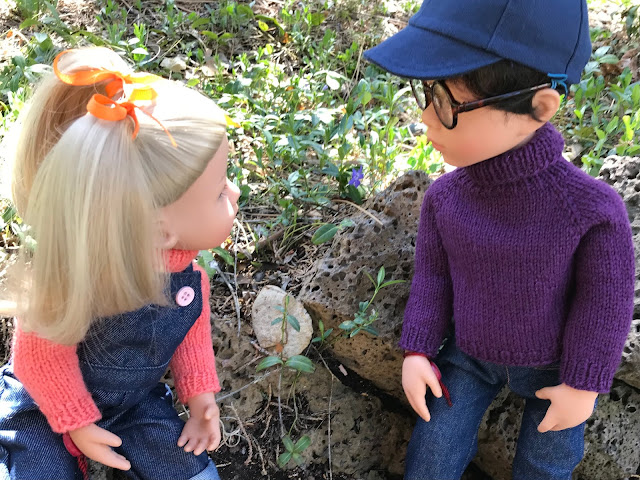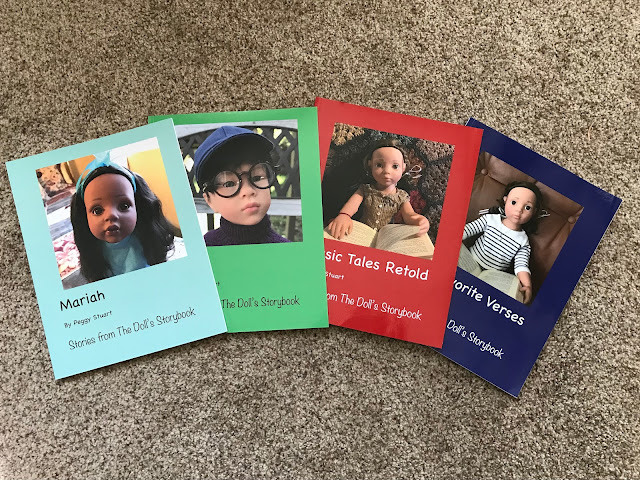Pippa had been looking all over for Emil. She finally found him in the backyard with Brownie.
Pippa made her way through the dog door to the backyard. It was hard to get through the dog door with her bear.
She left her bear on the bench on the back porch, made her way down the back steps and walked through the tall, green grass until she reached Emil.
"Emil," Pippa began when she had reached where he and Brownie were training each other, "could I ask you a question, if it isn't too personal?"
Emil laughed at the question. "What do you think I do, that your question might be too personal?" he asked.
"Well," Pippa began thoughtfully, "Veronika told me that some dolls don't like to be asked questions about themselves because it might be personal."
Brownie had been teaching Emil horse etiquette. She decided he was done learning how to behave with horses for now, so she led them to where there was more grass, and the dolls could sit where she could keep an eye on them while she pretended to graze. Grazing is something real horses do, Brownie knew.
Pippa climbed up and sat on the rock wall.
"Pippa," Emil told the younger doll, as he leaned against the wall, "I learned early in life that it's good to tell other dolls about myself if they ask, and it's good even if they don't ask."
"You see," he went on, "if you tell dolls something about yourself, say, maybe something you have trouble with or something you're trying out, they often respond by telling you about themselves, like how they took care of that kind of problem. They want to help. It makes dolls feel good to think they are helping."
"You learn things about them," Emil continued, "but you don't have to ask. You may find out even more than if you had asked."
"What if you haven't done much yet?" Pippa asked, "except gotten into trouble for looking through the cabinet in the bathroom."
"I'm sure other dolls would like to know about how you got into the cabinet," Emil told her, "and why you shouldn't do things like that. There are many things we shouldn't do."
Both dolls had to think about all the things a doll shouldn't do.
"Now," Emil went on, "I'm not talking about bragging," he said. "That's when you tell someone how wonderful you are because you did something well. That can make the other doll feel bad for maybe not being as good at that thing you did well. You can talk about something you're proud about, but by telling how it made you feel, not that you're wonderful because of it. If you brag about it, other dolls will stop listening."
Then Emil remembered that Pippa had come to ask him something. "Nothing is too personal for me, Pippa," he told her. "What did you want to know."
"Oh!" Pippa exclaimed. "I had forgotten!"
"My question is," Pippa said, "now that I know you don't mind if I ask, the other dolls told me that you can talk to the pets. Is that true?"
"Yes," Emil replied, "but I guess you could say we all can talk to the pets. It's just that the pets can talk to me. Other animals, too, and not just toy animals. I sort of hear them in my head, the way dolls talk to each other because our mouths don't move. They can tell me things, and I can understand them. Animals mostly show me pictures or share feelings they have, but they know a few words, too."
"Why?" Pippa asked next. "I mean, how is it that you can hear them talk to you and the rest of us can't?" It was hard to imagine.
"Mandy thinks she knows how," Emil replied. "She said that she read that dolls who are unable to see when they are made sometimes develop the ability to hear things other dolls can't, because they can use the part of the brain they would use for seeing, especially if they need to know more in order to go about their lives. The same thing happens with dolls who can't hear. They might learn to see or notice things dolls who can hear don't."
"Mandy said she thinks that's what happened to me," Emil went on, "only I couldn't see or hear, and when I got my special glasses that let me see and hear almost as well as other dolls, and needed to use those parts of my doll brain for those things, I had already learned how to hear what animals were saying."
"It's like a superpower," Pippa exclaimed.
It made Emil feel good to think that he had a superpower.
Brownie had wandered off to find more yummy green grass to pretend to graze on, so Emil and Pippa decided to go back to the porch. Pippa picked up her bear where she had left him on the bench. "Does my bear talk to you?" she asked Emil.
Emil looked at Pippa's bear and waited, as if he were listening.
"He can," Emil said finally looking up, "but he says he's meant to be a toy bear for you, so he doesn't need to talk. He's happy just being your teddy bear."
Pippa gave her bear a squeeze. "I'm happy he's just a teddy bear, too," she said.
"Mandy has to empty Marmalade's litter box, where he pretends to do his business," Pippa pointed out.
"Billy and Charlotte have to pick up after Freckles and Pierre," she went on, "on walks, when they pretend to do their business."
Pippa thought for a moment. "Do you have to pick up after Brownie when she pretends to do her business?" she asked Emil.
"Yes," Emil said. "Responsible dolls who have pets make sure their pets have food to pretend to eat and water to pretend to drink, but they also need to clean up after their pets when they pretend to do their business. It's like being a parent. We have to be responsible for our pets. Brownie's pretend business is good for the garden, too, so I save it for that."
"How does Veronika clean up after Cleo?" Pippa asked. "Cleo pretends to do her business in the water she lives in."
"Yes," Emil agreed. "That's why Veronika pretends to change Cleo's water every week," he explained. "She puts Cleo and her water into another container. Then she cleans out Cleo's bowl and pours new water in. She waits overnight to let something called chlorine (KLOR-een) leave the water."
"It's a gas, like the air," Emil said, "and it's used to make sure there aren't any germs living in the water that comes from the faucet, because those might make people sick. Chlorine is good for getting rid of germs, but it isn't good for fish, even doll fish, or plants. If you let the water sit overnight, though, the chlorine will leave the water and go into the air. Mandy explained it to me."
"The next day," Emil continued, "Veronika picks up Cleo gently in her hand and puts her into her bowl with the clean water. Some dolls use a special net to catch their fish, but Cleo trusts Veronika, and Veronika is very gentle."
Pippa thought about that. "Owning a pet can be a lot of work," she said finally. "I'm glad my bear is happy being just a teddy bear."
Emil had been thinking, too. He was glad he had Brownie. Brownie was the biggest pet in the family. "If I were looking for a pet," he said, "I don't think I would want it to be a bear."
There were bears in the house bigger than Brownie. That would be a lot of pretend business to pick up.
Mandy: Götz Happy Kidz Katie 2015
"The Doll's Storybook" is not affiliated with Gotz Dolls USA Inc. or Götz Puppenmanufaktur International GmbH.
Watch for the next story each Friday afternoon at 1:00 PM Pacific Time.
Copyright © 2021, 2024 by Peggy Stuart




































This story brought us a few laughs. Especially regarding pets and their "business." As always a great story.
ReplyDeleteThanks so much! (I have experience with pets and their business.)
Delete